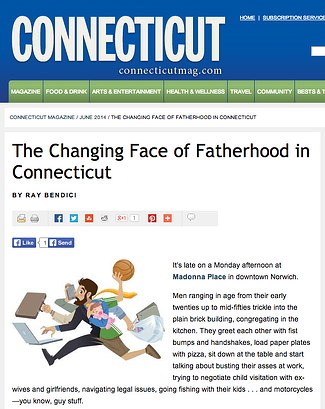See How Connecticut is Changing Fatherhood and Why It Matters to You
3 min read
Date Published: 06/25/2014
Last Updated: 10/29/2021
National Fatherhood Initiative Blog / Latest Articles
3 min read
In a recent issue of Connecticut Magazine, Ray Bendici writes, "The Changing Face of Fatherhood in Connecticut" and takes a look inside the fatherhood program that is literally changing lives. Learn what this group is doing to help dads connect with their children.
Ray writes for Connecticut Magazine:
it's Monday afternoon at Madonna Place in downtown Norwich, men ranging in age from their early twenties up to mid-fifties trickle into the plain brick building...They greet each other with fist bumps and handshakes, load paper plates with pizza, sit down at the table and start talking about busting their asses at work, trying to negotiate child visitation with ex-wives and girlfriends, navigating legal issues, going fishing with their kids...and motorcycles—you know, guy stuff.
 Will Marquez is the leader of the 24/7 Dad® program and leads a dozen men in 90-minute sessions all connected and ready to learn how to be better dads.
Will Marquez is the leader of the 24/7 Dad® program and leads a dozen men in 90-minute sessions all connected and ready to learn how to be better dads.
Bendici points out that around 90 percent of the men in this program are single dads and are referred either by a social services agency or others who have successfully completed the program.
Some things jumped out at me from Bendici's article that will prove useful and encouraging for you.
U.S. Census data for Connecticut shows that in 2000:
By 2010, that number had dipped to:
In Bendici words, "there are more singleparents—and singledads—than ever before, which means fatherhood has become an evolving enterprise."
As we know from our years of experience working with community-based fatherhood programs, many point to employment as one of the biggest roadblocks to improved paternal relations, Anthony Judkins, program manager of Connecticut’s Fatherhood Initiative since it started in 1999 says, “When you have children, there are no instructions on being a father...when you have been incarcerated and you are a felon, when you have low education levels, when you have child-support debt that continues to mount—those things are sometimes insurmountable." This is where the fatherhood program comes in.
The fatherhood program in Norwich has been successful:
All of the above positive results have, as you might imagine, translated into better relationships with their children.
As one session at Madonna Place wraps up, Bendici recalls an exercise. Will Marquez poses a scenario of teenage son smoking marijuana, and asks the fathers in the group how they would handle the situation, especially given that many of the dads have used it themselves.
Bendici writes that, "Before the discussion goes too far, a man named Jeff raises his hand—he thinks his 15-year-old son may already be using marijuana. “I was that age when I started smoking, so trust me, I can tell,” he says."
The dads in the group have a wide variety of advice, some common sense and some not-so-common. But, Jeff is happy to have the support of other dads. After listening to the advice, he replies, “I think I have a good idea of how I’m going to address it now.”
As the group breaks for the evening, Travis (a father of three) is seated at a table, completing an exit survey (this was his twelfth and final session to get his certificate of completion).
Bendici recalls overhearing a conversation between Travis and another dad, “So are you done here now that you’ve got it?” someone asks him. “No,” Travis says with a smile. “I’ll definitely be back for more.”
I'm glad Bendici wrote about this fatherhood program. While reading this story, I was reminded of how much work there is to do in helping dads be better dads. Fatherhood work can seem daunting; but, it's encouraging to know groups like this one in Connecticut exist, not only because Connecticut families need it, but every family needs it.
Date Published: 06/25/2014
Last Updated: 10/29/2021
Download the ebook to learn how to create fatherhood initiatives that engage every sector of community life.

Train Your Staff
Fatherhood Programs
Fatherhood Data
© 2025 National Fatherhood Initiative®. All rights reserved.